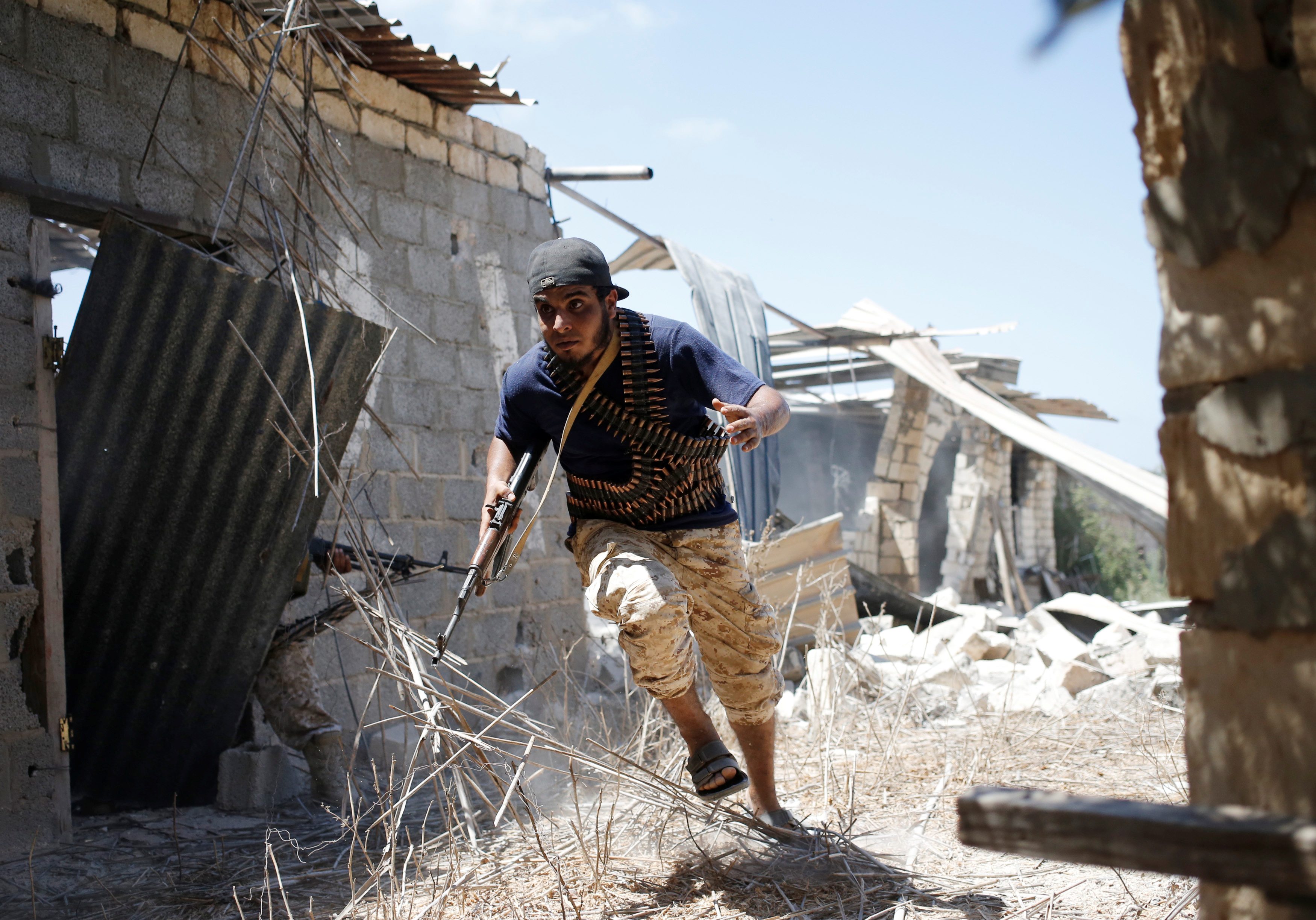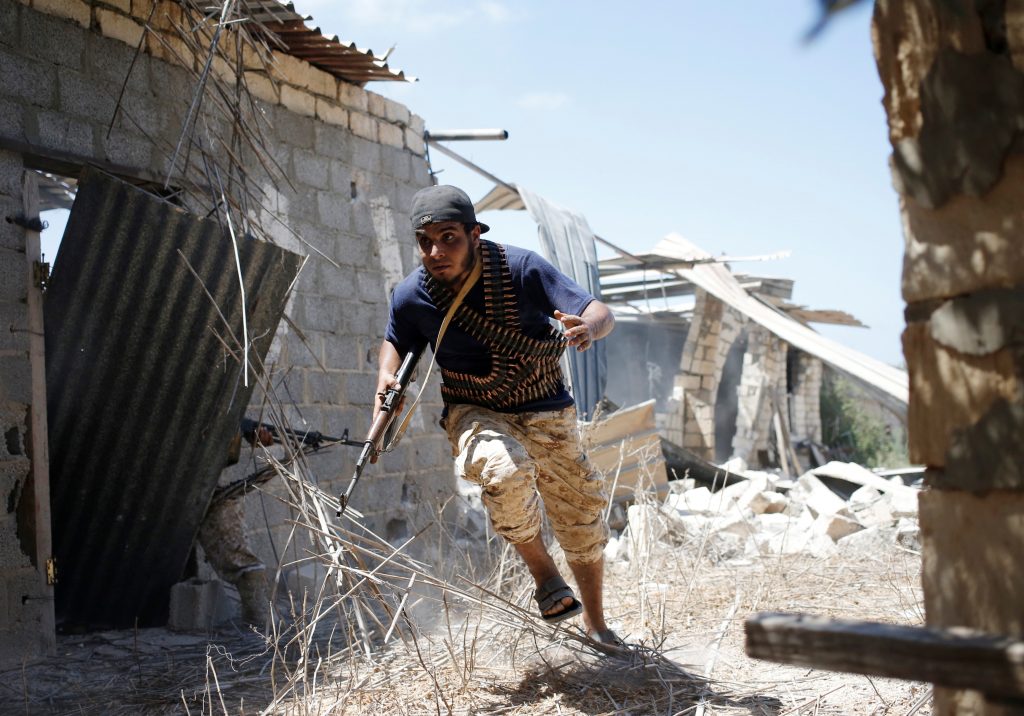 Following a formal request from the internationally recognized Libyan Government of National Accord (GNA), the United States air force conducted strikes against militants of the so-called Islamic State (ISIS or ISIL) in the city of Sirte on August 1. It is possible that military commanders of militias from Misrata—directly involved in the fight to liberate Sirte from ISIS—had repeatedly requested assistance. However, the United States did not step in to provide air support to the Misratan forces until it was formally and publicly requested by GNA Prime Minister Fayez Serraj. The high number of casualties caused by ISIS snipers, which remain entrenched in some buildings in the center of the city, pushed the Misratan military commanders to request US aerial bombing to eradicate the ISIS forces. The US strikes are an important step in pushing ISIS out of Sirte and in supporting the GNA’s actions in Libya. However, much more needs to be done to bolster the GNA’s local support on the ground in Libya.
Following a formal request from the internationally recognized Libyan Government of National Accord (GNA), the United States air force conducted strikes against militants of the so-called Islamic State (ISIS or ISIL) in the city of Sirte on August 1. It is possible that military commanders of militias from Misrata—directly involved in the fight to liberate Sirte from ISIS—had repeatedly requested assistance. However, the United States did not step in to provide air support to the Misratan forces until it was formally and publicly requested by GNA Prime Minister Fayez Serraj. The high number of casualties caused by ISIS snipers, which remain entrenched in some buildings in the center of the city, pushed the Misratan military commanders to request US aerial bombing to eradicate the ISIS forces. The US strikes are an important step in pushing ISIS out of Sirte and in supporting the GNA’s actions in Libya. However, much more needs to be done to bolster the GNA’s local support on the ground in Libya.
The United States was the main supporter of Libyan negotiations carried out under UN leadership that resulted in the signing of a Libyan Peace Agreement (LPA) in December 2015 in the Moroccan city of Skhirat. The negotiations, which took more than 18 months, aimed at reaching a peace agreement that would suspend hostilities and return order and stability to the country. The LPA calls for the appointment of a presidential council (PC) of nine members, led by a prime minister, which is tasked with appointing a unity government. The international community immediately recognized and expressed its support for the LPA, however the same cannot be said for the competing power bases within Libya.
The House of Representatives (HoR), the legislative body elected in 2014 and based in the eastern city of Tobruk, a few miles from the Egyptian border, continues to pose a considerable challenge to the LPA. A majority of HoR members reportedly expressed support for the LPA, but object to Article 8 of the agreement, which stipulates bringing the military under control of the new government and a reset of all military positions. This article poses a threat in particular to General Khalifa Haftar, who leads a ragtag army of forces from former Qaddafi units and local tribal and neighborhood militias. Haftar, who is strongly supported by the United Arab Emirates and Egypt, countries that have made their opposition to political Islam a bastion of their national interest, launched a major attack in 2014 against Islamist forces in the city of Benghazi that is still wracked by violence. The HoR, which is under Haftar’s influence, has periodically attempted to hold a vote on the LPA, but it has never reached the quorum necessary to do so due to boycotts by some members. By neglecting to ratify the constitutional amendment that would lend validity to the LPA and the process of shoring up the GNA’s legitimacy, it can be argued that the HoR has exhausted its own legitimacy as Libya’s legislative body. The international community therefore remains the main source of support for Serraj’s government.
The GNA has faced other major difficulties since arriving in Tripoli at the end of March. The government’s security is based upon a fragile agreement with the various militias present in the capital, and they would not hesitate to take advantage of and influence the GNA’s decisions. In June, Serraj underlined the GNA’s lack of control in Tripoli when he admitted that militias are still in control of electricity distribution in the city. Moreover, most members of the government are unable to move freely in the urban area of Tripoli, and most ministers have yet to gain control of their offices and other infrastructure.
Amid the many challenges facing the GNA, it is critical that the United States and its western allies support Serraj’s government in actions as well as words. This is why the aerial intervention carried out by the United States against ISIS in Sirte is so important. With this action, the United States is sending a clear message to all actors in Libya, and to their regional supporters, that not only is it committed to the war against ISIS, but it is also actively on the side of the GNA forces. European allies have also expressed support for this campaign. In particular, Italy said it would be willing to consider granting the United States use of the Sigonella air base and others for strikes against ISIS in Libya.
The United States is, meanwhile, clearly relying on GNA-backed forces to fight ISIS on the ground in Libya, as there is no US intention to widen the specter of the international intervention to ground forces. The GNA as well does not seem intent on asking the West for this kind of intervention. In fact, the forces from Misrata have practically carried out the attacks against ISIS alone, with Haftar’s army notably absent from the battlefield in Sirte.
One of the main effects of US intervention in Sirte could be a reinforcement of the GNA’s legitimacy. However, this will not be enough to strengthen the legitimacy of the government on the ground in Libya once and for all. The GNA still needs to prove its capacity to act and carry out decisions that could improve its popularity among the population. For example, it is undoubtedly important to free Sirte from ISIS, but what the GNA does to stabilize Sirte after the liberation will be much more important. Whether the GNA and its European and US allies have a plan for the restoration of order in the city remains to be seen.
The historical rivalry between the inhabitants of Sirte and those of Misrata makes it impossible for the latter to maintain a military presence in the city after ISIS is ousted. It is up to the GNA to find independent armed forces that can restore order and security to Sirte, guarantee the return of its citizens, and forbid the return of ISIS militants. At the moment, it doesn’t look like such a force exists. There are rumors, but nothing more, of the formation of a “presidential guard.” Should the government succeed in establishing such a military guard, the West can play an essential role by training and equipping such a force. There is no doubt that success in the fight against terrorism in Libya requires stability in the country. It will therefore be extremely important to see how western powers will continue to support Serraj’s government and if the latter will succeed in widening its authority in Tripoli and the whole of Libya.
Karim Mezran is a resident senior fellow with the Atlantic Council’s Rafik Hariri Center for the Middle East. Elissa Miller is a program assistant at the Atlantic Council’s Rafik Hariri Center for the Middle East.
Image: A fighter of Libyan forces allied with the U.N.-backed government runs for cover during a battle with Islamic State fighters in Sirte, Libya, July 31, 2016. (Goran Tomasevic/Reuters)
